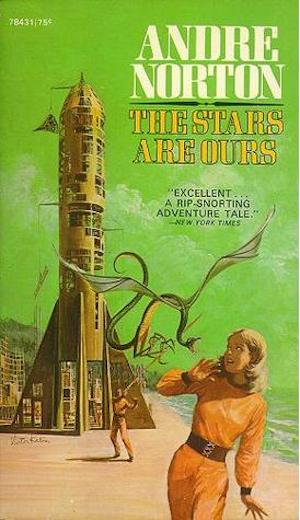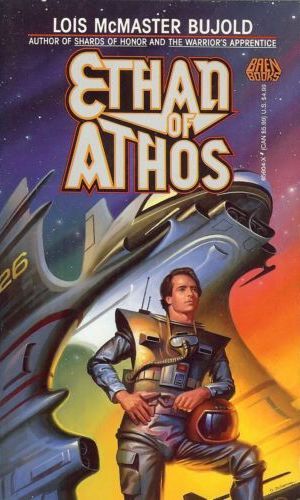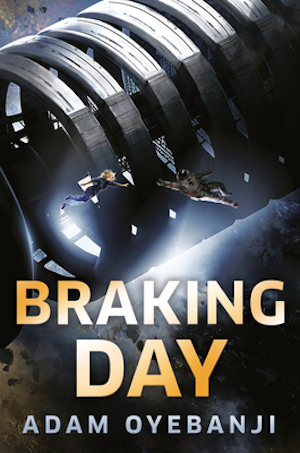History is full of stories about folks who dislike (or fear) their governments, have no way to alter said governments, and must relocate (or flee): Huguenots fleeing persecution in France, Irish fleeing famines that English colonialists ignored, and the Pilgrims fleeing Dutch religious tolerance all come to mind.1
It’s no surprise, therefore, that numerous science fiction authors have written about politically-motivated migration. 2 Consider the five following works, representing only a small sample from a well-populated category…3
The Stars Are Ours! by Andre Norton (1954)

Hard-working scientists taught the governments of the world how to make A-bombs, H-bombs, and finally Null-bombs. The few people who survived nuclear holocaust blamed the remaining scientists. Now unified under the oppressive Pax regime, Earth has embraced an unrelenting anti-science policy. On the plus side: no more nuclear wars. On the minus side: the entire planet is sliding toward a dark age.
A handful of scientists have decided to flee and have developed a cold sleep formula that will allow them to escape in a secretly assembled spacecraft. The migrants hope that they will find a verdant, human-habitable paradise at the end of their journey. What they find is a world with its own native people, living amid the ruins of a long dead civilization whose malevolent overlords may not be quite as extinct as one might hope.…
Orbit Unlimited by Poul Anderson (1961)

The Guardian Commission does its best to keep the gears of civilization spinning on an increasingly overcrowded, impoverished Earth. Efficient use of dwindling resources demands sacrifices: no more democracy, no more Venus colony. At the same time, the Commission is well aware that Earth cannot afford to crush another rebellion, lest the entire system collapse into a new dark age. Thus, when North American Constitutionalists become troublesome once more, the Commission provides an alternative to fruitless uprising: the Constitutionalists can have a fleet of mothballed sublight starships and leave Earth forever for e-Eridani’s habitable planet Rustum.
Starships are slow and the galaxy vast. The migrants are lucky that a world as hospitable as Rustum is within reach. However, Rustum is no paradise. Only its continental highlands are habitable by terrestrial standards. The colonists have only the technological resources that fit in fifteen starships. Perhaps they will succeed in creating a new America. Or perhaps they will fail, leaving ruins hidden in silent forests to show that humans briefly lived on Rustum.
Rissa Kerguelen by F. M. Busby (1977)

United Energy and Transport rules North America with an iron fist. Life is borderline tolerable if you are obedient and silent; it’s impossible if you resist. The UET regime, uninhibited by democracy, squeezes every possible penny of profit out of North America’s subjugated population.
Resistance is futile. But there are those, like Rissa Kerguelen, who would escape if they had the opportunity.
An unexpected lottery win in combination with some quick thinking provides Rissa with a ticket off-planet. Since UET has a monopoly on starships, this might seem to be trading one UET-run dystopia for another. However, UET’s starships are sublight, and UET’s control weakens the farther one gets from the Sun…
Which isn’t to say there aren’t other dangers threatening Rissa.
Ethan of Athos by Lois McMaster Bujold (1986)

Technology offered escape to a community of women-hating religious fanatics. Firstly, uterine replicators free the misogynists from dependence on female labour in the matter of reproduction. Secondly, starships could deliver the community to the planet Athos, where the settlers could enjoy lives of purity, uncontaminated by women.
After sufficient time has passed for the all-male community on Athos to develop in directions not entirely those intended by the founders, Athos is forced to confront the key flaw in their arrangement. While they do not need female wombs, they do need human ovaries. When the awaited shipment arrives sans ovaries, someone—the unlucky Ethan of the title—will have to venture out into a universe he believes to be filled with sultry demonesses.
Braking Day by Adam Oyebanji (2022)

Earth’s AI-run nanny state offered its citizens stultifying security and acceptable levels of creature comfort. Some didn’t want to settle for such a life. Seven generations ago, three generation ships—Archimedes, Bohr, and Chandrasekar—set course for Tau Ceti and freedom. At least, that’s the official history that Midshipman Ravi MacLeod has been taught.
Tau Ceti is very nearly within reach. Ravi is determined to prove he is more than another crooked MacLeod, someone worthy of senior rank. However, the official history of the fleet has elided embarrassing details. Forgotten secrets are about to come to the surface. Violence is predictable. If the fleet is to survive, Ravi will have to apply not just his sanctioned skill set as a trainee engineer, but the illicit skills that are the birthright of the steadfastly criminal MacLeod clan.
***
This is, as I say, a very popular subgenre. No doubt many of you have favourites that you are outraged I failed to mention. Comments are, as ever, below.
In the words of fanfiction author Musty181, prolific book reviewer and perennial Darwin Award nominee James Davis Nicoll “looks like a default mii with glasses.” His work has appeared in Publishers Weekly and Romantic Times as well as on his own websites, James Nicoll Reviews (where he is assisted by editor Karen Lofstrom and web person Adrienne L. Travis) and the 2021 and 2022 Aurora Award finalist Young People Read Old SFF (where he is assisted by web person Adrienne L. Travis). He is a four-time finalist for the Best Fan Writer Hugo Award, and is surprisingly flammable.
[1]“Wait,” you say, “how was Holland being oppressive to the Pilgrims?” Well, to some people, having to tolerate nonconformity is oppressive. Allow me to quote a venerable book, de Camp’s “Lest Darkness Fall”: “You don't like the Goths?” “No! Not with the persecution we have to put up with!” “Persecution? ” Padway raised his eyebrows. “Religious persecution. We won't stand for it forever.” “I thought the Goths let everybody worship as they pleased.” “That's just it! We Orthodox are forced to stand around and watch Arians and Monophysites and Nestorians and Jews going about their business unmolested, as if they owned the country. If that isn't persecution, I'd like to know what is!”
[2]There are also tales of those who abandon Earth because it has been destroyed by human stupidity or global calamity. I have a hard time accepting these settings as plausible. How is a borderline habitable Earth to build starships? Starflight as a means of fleeing oppression makes a lot more sense. To me at least.
[3]My first draft featured a number of interesting novels which I then decided to edit out. Listing them here would have been a huge spoiler. Books like REDACTED, REDACTED, and REDACTED, for example.











Um. I seem to have formatted my quotation of de Camp such that the text does not manifest in the footnote. Whoops.
@1: The quoted text should be showing up now! The footnote widget was just being uncooperative, as usual :)
Thank you!
This is one of the benefits of those narrative universes with cheap non-WMD NAFAL starships: cruise a few thousand light years and you can be sure whatever situation you didn’t like will be completely different if you ever go back.
Can anyone explain to me how REDACTED even got published?
REDACTED, on the other hand, got hosed at the Hugos.
The son of Duke Leto flees into exile, but he does it the old-fashioned way on foot (partially).
I wish to object to the noninclusion of REDACTED, which is not only better written than every other book mentioned, but also has the unique distinction of containing six remarkably accurate predictions about events in 2018, 2022, REDACTED and REDACTED. Not bad for a book written in the spring of 19–!
Reading footnote #1 reminded me of the saying: to the privileged, equality feels like oppression.
On a less undesirable note, the late Mike Scott Rohan’s first novel, Run to the Stars, would be a good fit for this category (although I don’t know if it was ever published in the North American colonies).
I don’t think it’s too spoilicious to observe that The Book of the New Sun is (at some level) about a young man’s year in exile. For that matter, The Book of the Short Sun is largely about exiles from REDACTED.
I’m just wrapping up a read of Record of a Spaceborn Few, by Becky Chambers. It centers around the Exodus Fleet, where the last surviving humans went forth to find a new home after Terra could no longer support them. What happens, however, if your journey ends but you don’t want to leave your ship?
Just last night I was making a list of my favorite authors. Four of the first few I wrote down were Norton, Busby, Anderson and Bujold.
The author of REDACTED also made the list.
@11: depending on how you define “arrived”, possibilities include either “Common Sense” (Heinlein) or “Riding the Torch” (Spinrad).
Since you’re including books with a flight in their (often distant) past (i.e., not just books about the flight, like the Norton), I’ll note Rite of Passage and possibly Lord of Light (ISTM unclear that “vanished Urath” was fled from rather than simply lost as in The High Crusade).
Barnes’s “Thousand Cultures” books also stem from flight-in-order-to-be-“pure” — although ISTR we’re told that what was sent is data and fertile cells rather than people.
There’s also exile via time travel as in Julian May’s Saga of the Pliocene Exiles which some people may be familiar with.
@11,
In Chambers’ first book, the protagonist is also running away.
Alan Steele’s Coyote series run on this trope, I seem to recall, with the colonists stealing an experimental starship from a tyrannical Earth government.
As noted in the article, however, those who want to flee are not always simply noble freedom seekers – one of the things that makes Ethan of Athos an interesting, and typically character-driven Bujoldian exception to the general rule is the motive for the Athosians original isolation.
@16: Bujold also has a much more conventional example with the Quaddies in Falling Free.
The Long Run by Daniel Keys Moran is a caper novel which also involves a young thief choosing exile over certain death and worse at the hand of the United Earth government. But he’s going to hurt them on his way out.
I tend to read more about refugees, which are not quite the same as exiles, although I suppose you could argue that one one way or another.
All this talk of exiles an no mentions of the Exiles Trilogy.
https://jamesdavisnicoll.com/review/when-you-hear-the-wild-geese-calling
16: Technically correct in that the government they were fleeing was on Earth but as I recall it was a national-level fascist government in the USA. Which I think had been renamed so people would know it was tyrannical. As I further recall, the leftist dictatorship that overthrew the fascists was just as bad.
19: I was pretty sure I’d mentioned the Exiles Trilogy in a previous essay.
Ethan of Athos wasn’t the first book to try the idea of a single-sex planet – Virgin Planet by Poul Anderson has an all-female world, Chandler’s False Fatherland aka Spartan Planet is all male. Both are ruled by medical-religious cults which to some extent are conning the rest of the world (not the case in EoA, where the government is honest), and encounter out of context problems when someone from the other sex arrives and refuses to play ball…
On a more modest scale, Themiscyra (Wonder Woman) is an all-female island whose inhabitants moved there to escape from male domination. Being more or less immortal helps with population issues!
“If everyone just sat at home, nothing would ever happen” – approximately what the original, radio, “Hitchhiker’s Guide to the Galaxy” said first about an observation that “most of the things which stir the universe up” involve dispossessed people.
I think it’s a bit false — probably better to say a lot false — to say that the Pilgrims were fleeing religious tolerance in Holland. Instead, they were fleeing the prospect of James I and the King of Spain uniting to force Holland to expel them — presumably back into the not so welcoming arms of England.
And it seems an odd choice to say they “had to tolerate nonconformity” when in not too many years, those of their doctrinal persuasion who stayed in England would be called “nonconformists” — for not conforming to the Church of England.
@23, it’s funny to say the Pilgrims were fleeing religious tolerance but it’s more accurate to say they were fleeing assimilation. They didn’t want their children to grow up Dutch. It’s also confusing the Pilgrims with the far more organized and intolerant puritans of the Massachusetts Bay Colony. It may be hard for us to tell them apart but there were real doctrinal differences between the assorted religious sects that colonized America. Some were more willing than others to live and let live.
Also people took their theology very seriously back in the day. They reacted to ‘disinformation’ about salvation about the same as current Americans respond to political ‘disinformation’. Also the Arians and Monophysites disliked tolerance as much as the orthodox.
If we’re doing individual as well as group flight, Heinlein’s Friday was glad to leave Earth for a planet where people treated her better, and was glad to never go back.
@25: Heinlein also had the Howard Families taking leave of the solar system in Methuselah’s Children, being hunted for a secret they didn’t have; later in the frame story of Time Enough for Love Lazarus Long and his cult notice that the planet they’re on is rather civilized and therefore collapse must be just around the corner, so they trot off to an empty planet and set up light housekeeping.
MCA Hogarth’s Peltedverse series has races who were genetically engineered as a mix of human and animal DNA, some more human in appearance than others but all people. In the backstory to the series, the Pelted fled Earth, where they were property, for the stars and freedom. And then, some hundreds of years later, when the two groups met again, Earth had backslid technologically while the Pelted had become much more advanced.
Terrence Cee is also fleeing into exile in Ethan of Athos, for somewhat different reasons.
Re: “How is a borderline habitable Earth to build starships?” it depends on the nature of the problem, and the degree of willingness to try to get some survivors someplace safe rather than having everybody die. If some disaster is looming and inevitable but the current situation is manageable, it’s not impossible that people could work towards building some Ark-like craft. Sending representatives of a wide variety of cultures into exile in the hope of finding a new inhabitable planet, perhaps one orbiting a class ‘G’ solar sun. Granted, there’s a difficult line to walk if one wanted to include non-technological cultures, given the nature of the trip, but as long as those people were kept isolated in their own little domes, they might even forget that they were on a spaceship. I’m sure that a talented, patient author could get something worthwhile out of the scenario.
Can we include non-permanent exile? The Rainbow Connection would qualify. The main character intends to leave earth permanently, but….
In Poul Anderson’s Tau Zero, the space-farers are exiled from their entire universe.